Laurence de Looze
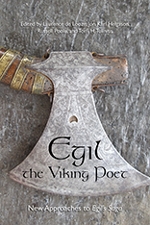 Egil the Viking Poet: New Approaches to Egil's Saga (editor)
Egil the Viking Poet: New Approaches to Egil's Saga (editor)
Egil, the Viking Poet focuses on one of the best-known Icelandic sagas, that of the extraordinary hero Egil Skallagrimsson. Descended from a lineage of trolls, shape-shifters, and warriors, Egil’s transformation from a precocious and murderous child into a raider, mercenary, litigant, landholder, and poet epitomizes the many facets of Viking legend.
The contributors to this collection of essays approach Egil’s story from a variety of perspectives, including psychology, philology, network theory, social history, and literary theory. Strikingly original, their essays will appeal not only to dedicated students of Old Norse-Icelandic literature but also to those working in the fields of Viking studies, comparative ethnology, and folklore. 2015, University of Toronto Press.
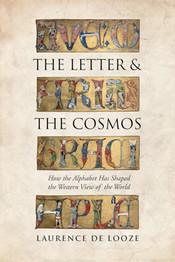 The Letter and the Cosmos: How the Alphabet has Shaped the Western View of our World
The Letter and the Cosmos: How the Alphabet has Shaped the Western View of our World
This book puts forth a double thesis regarding the alphabetic letter in Western culture from the Ancient Greeks to the present day. It maintains first of all that the alphabet has consistently been an optic through which the people in the West conceive their world. But just as importantly, this book argues that the world, and even the cosmos, has been seen in Western culture as a kind of alphabet. Beginning with alphabetic writing in Ancient Greece, this book follows the mythos of the alphabetical letter across the centuries, largely through its Roman forms. However, rather than being simply a history of the alphabet (of which there are many), this book provides copious examples that illustrate how the alphabet is repeatedly called upon to express ever-changing conceptions of the world. To make its case, the book draws on philology, history, literary studies and linguistics. 2016, University of Toronto Press.
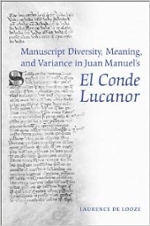 Manuscript Diversity, Meaning, and Variance in Juan Manuel’s El conde Lucanor
Manuscript Diversity, Meaning, and Variance in Juan Manuel’s El conde Lucanor
Juan Manuel's El Conde Lucanor was arguably one of the great masterworks of early modern Spain. Although the work appears in five very different manuscript versions from the fourteenth to the sixteenth centuries, most modern editions of El Conde Lucanor have neglected to account for the fact that it was part of a manuscript tradition, and that its meaning is substantially affected when its original forms are not taken in to account.
With Manuscript Diversity, Meaning, and Variance in Juan Manuel's El Conde Lucanor, Laurence de Looze demonstrates how the meaning of Juan Manuel's work changes depending on how the work is 'performed' in particular manuscripts. This study proceeds from the assumption that, in a pre-printing press world, each new copy or 'performance' of a work creates new meaning. By adopting this approach and by focusing on Parts II-V of the texts, de Looze argues that El Conde Lucanor raises questions about the interretation, intelligibility, and the production of knowledge. De Looze's complex and nuanced reading sheds new light on an important work and makes a significant contribution to medieval studies, Spanish studies, and the history of the book.
Working from the stance that every hand-produced copy in a pre-print culture is a rewriting (and a new edition) of a text, de Looze examines one of the most important works of the Middle Ages in Spain as it actually exists in situ in the manuscripts. What is discovered is a multiplicity of meanings, most of which have been emended out of modern editions. de Looze rereads El Conde Lucanor in terms of Derridean deconstruction and reception aesthetics; the result is a work that tests the limits of intelligibility. 2006, University of Toronto Press.
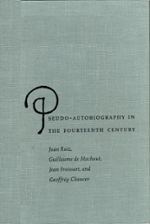 Pseudo-Autobiography in the Fourteenth Century: Juan Ruiz, Guillaume de Machaut, Jean Froissart, and Geoffrey Chaucer
Pseudo-Autobiography in the Fourteenth Century: Juan Ruiz, Guillaume de Machaut, Jean Froissart, and Geoffrey Chaucer
In Pseudo-Autobiography in the Fourteenth Century, Laurence de Looze examines representative "books of the self" by four prominent medieval authors in order to discover how such texts have been read both as works of autobiographical "truth" and as works of pure literary artifice. In formulating an answer, he considers whether there is anything that inheres in a text that makes it necessarily autobiographical, and how the term autobiography may describe, in these instances, a way of reading more than a way of writing.
In the course of his study, de Looze develops a method of analyzing "pseudo-autobiography" that transcends national boundaries and scholarly subdisciplines, and he applies the methods and concerns of modern literary theory to the interpretation of medieval texts. At the same time, he grounds his study thoroughly in the medieval context of these works, discussing the tradition and its pertinent texts--from Augustine and Boethius through Jean de Meun and beyond--thus providing a substantial chronological and linguistic range for his discussion.
Because it offers insights into the works of four prominent medieval writers and proposes a new, reader-oriented typology of autobiographical writing, de Looze’s study will be of wide interest among medievalists and will also appeal to anyone interested in the kinds of misreading we all engage in when we try to interpret literary texts. 1997, University Press of Florida.
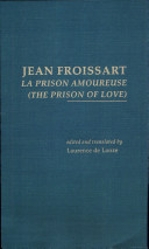 Jean Froissart, La Prison Amoureuse (trans.)
Jean Froissart, La Prison Amoureuse (trans.)
An edition and translation of the most important work by the 14th-century poet and chronicler, Jean Froissart. 1994, Routledge.



